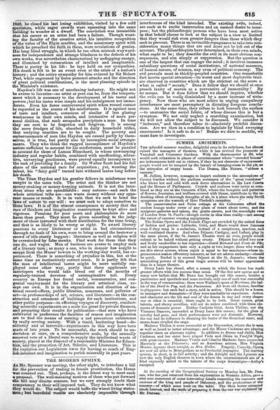SUMMER AM - MEW:NTS.
THE splendid summer weather, delightful even in its sultriness, has almost ruined the managers of theatres, while it has revived the prospects of Vauxhall and Cremorne Gardens. With the thermometer at 90, who would seek relaxation in places of entertainment where "crowded houses" are inducements held out to visitors, if they be not elements of enjoyment: people would not be tempted by the luxury of lounging-room in the pit, or the attraction of empty boxes. The Drama, like Nature, "abhors a vacuum."
M. Jullien, however, manages to impart coolness to the atmosphere of Covent Garden without the perilous assistance of the "great ventilator" who blows hot and cold with such fierce alternations in the Law Courts and the Houses of Parliament. Crowds and coolness were never so com- bined as they are at the Concerts d'Ete, where the bouquets and parterres of flowers, fountains, and trellises covered with bloom, contribute to the re- freshing effect of thorough draughts of air, in a place where the only fervid symptoms are the warmth of Herr Pischek's reception.
The conservatories and Swiss cottage at the Colosseum afford the coolest lounge under cover of any place of resort about town; and the sculpture galleries and saloon, the grotto cavern, and the moonlight view of London from St. Paul's—though cooler in ides than reality—are among the rarest of summer evening enjoyments.
The Italian Opera and the French Plays are crowded by the united force of fashion and genius: Lablaohe, Grisi, and Mario would draw listeners even if they sung in a sudarium, instead of a sumptuous, spacious, and well-ventilated theatre. And when Dejazet, Cartigny, and Lafont, play in the same pieces, if the St. James's Theatre were an oven, people would submit to be baked without getting crusty. Dejazet has added two new and lively vaudevilles to her repertoire—Gentif Bernard and Conte de Fie; and as her engagement lasts only a night or two longer, those who would see this clever actress, whose esprit is equal to her sauciness—whose in- genuousness makes effrontery innocent, as her art adorns audacity—should be quick. Rachel is to succeed Dejazet at the St. James's ; where the astonishing powers of this great tragic actress will be better approtiaterl than in a larger theatre.
Drury Lane has closed, after a season in which the lessee has made
greater efforts with less success than usual. Of the five new operas and as many new ballets that Mr. Bunn has brought out this season, besides a pantomime and spectacle and some revivals, only one of each was successful in the way of remuneration: these were Wallace's opera of Iffirritana, the bal- let of the Devil to Pay, and the Pantomime. All were old themes, familiar to playgoers; but each had a story, told in action. This should be a lesson to managers and dramatists—if they were teachable by experience. Action and character are the life and soul of the drama in any and every shape: one or other is essential; there ought to be both. Great names, great talents, and showy novelties, will not do unless combined with these ele- ments of dramatic power. Neither Carlotta Grisi,Anna Thillon, nor the Viennese Dancers, succeeded at Drury Lane this season; for the gloss of novelty had gone, and their performances were not dramatic. However, the sun had its influence in dimming the lustre of the theatrical stars; and steam-boats rivalled the stage.
Madame Thillon is more successful at the Haymarket, where she is seen
as well as heard to better advantage; and the Misses Cushman are playing together there on alternate nights. In addition to Romeo and Juliet, Miss Cushman and her sister have played Viola and Olivia in TwelfteNight, with great success. Madame Vestris and Charles Mathews have succeeded Macready at the Princess's; and an American actress, Miss Virginia Monier, appears there tonight, as Mrs. Haller. Tragedy, Comedy, Opera, are now all alike to Metropolitan as to Provincial managers. The starring system, in short, is in full activity; and the Adelphi and the Lyceum are now the only English theatres in town where the entertainments are of a kind expressly suited to the talents of the corps dramatique—Astley's excepted.


























 Previous page
Previous page